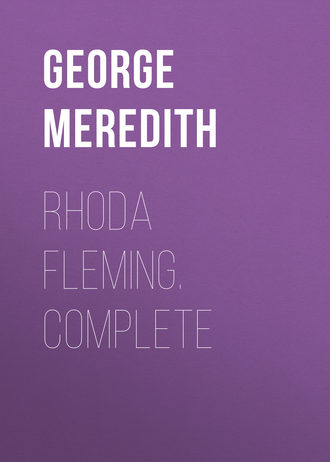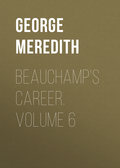
George Meredith
Rhoda Fleming. Complete
And behold our friend the sailor of the boards, whose walk is even as two meeting billows, appears upon the lonely moor, and salts that uninhabited region with nautical interjections. Loose are his hose in one part, tight in another, and he smacks them. It is cold; so let that be his excuse for showing the bottom of his bottle to the glittering spheres. He takes perhaps a sturdier pull at the liquor than becomes a manifest instrument of Providence, whose services may be immediately required; but he informs us that his ship was never known not to right itself when called upon.
He is alone in the world, he tells us likewise. If his one friend, the uplifted flask, is his enemy, why then he feels bound to treat his enemy as his friend. This, with a pathetic allusion to his interior economy, which was applauded, and the remark “Ain’t that Christian?” which was just a trifle risky; so he secured pit and gallery at a stroke by a surpassingly shrewd blow at the bishops of our Church, who are, it can barely be contested, in foul esteem with the multitude—none can say exactly, for what reason—and must submit to be occasionally offered up as propitiatory sacrifices.
This good sailor was not always alone in the world. A sweet girl, whom he describes as reaching to his kneecap, and pathetically believes still to be of the same height, once called him brother Jack. To hear that name again from her lips, and a particular song!—he attempts it ludicrously, yet touchingly withal.
Hark! Is it an echo from a spirit in the frigid air?
The song trembled with a silver ring to the remotest corners of the house.
At that moment the breathless hush of the audience was flurried by hearing “Dahlia” called from the pit.
Algernon had been spying among the close-packed faces for a sight of Rhoda. Rhoda was now standing up amid gathering hisses and outcries. Her eyes were bent on a particular box, across which a curtain was hastily being drawn. “My sister!” she sent out a voice of anguish, and remained with clasped hands and twisted eyebrows, looking toward that one spot, as if she would have flown to it. She was wedged in the mass, and could not move.
The exclamation heard had belonged to brother Jack, on the stage, whose burst of fraternal surprise and rapture fell flat after it, to the disgust of numbers keenly awakened for the sentiment of this scene.
Roaring accusations that she was drunk; that she had just escaped from Bedlam for an evening; that she should be gagged and turned headlong out, surrounded her; but she stood like a sculptured figure, vital in her eyes alone. The farmer put his arm about his girl’s waist. The instant, however, that Anthony’s head uprose on the other side of her, the evil reputation he had been gaining for himself all through the evening produced a general clamour, over which the gallery played, miauling, and yelping like dogs that are never to be divorced from a noise. Algernon feared mischief. He quitted his seat, and ran out into the lobby.
Half-a-dozen steps, and he came in contact with some one, and they were mutually drenched with water by the shock. It was his cousin Edward, bearing a glass in his hand.
Algernon’s wrath at the sight of this offender was stimulated by the cold bath; but Edward cut him short.
“Go in there;” he pointed to a box-door. “A lady has fainted. Hold her up till I come.”
No time was allowed for explanation. Algernon passed into the box, and was alone with an inanimate shape in blue bournous. The uproar in the theatre raged; the whole pit was on its legs and shouting. He lifted the pallid head over one arm, miserably helpless and perplexed, but his anxiety concerning Rhoda’s personal safety in that sea of strife prompted him to draw back the curtain a little, and he stood exposed. Rhoda perceived him. She motioned with both her hands in dumb supplication. In a moment the curtain closed between them. Edward’s sharp white face cursed him mutely for his folly, while he turned and put the water to Dahlia’s lips, and touched her forehead with it.
“What’s the matter?” whispered Algernon.
“We must get her out as quick as we can. This is the way with women! Come! she’s recovering.” Edward nursed her sternly as he spoke.
“If she doesn’t, pretty soon, we shall have the pit in upon us,” said Algernon. “Is she that girl’s sister?”
“Don’t ask damned questions.”
Dahlia opened her eyes, staring placidly.
“Now you can stand up, my dear. Dahlia! all’s well. Try,” said Edward.
She sighed, murmuring, “What is the time?” and again, “What noise is it?”
Edward coughed in a vexed attempt at tenderness, using all his force to be gentle with her as he brought her to her feet. The task was difficult amid the threatening storm in the theatre, and cries of “Show the young woman her sister!” for Rhoda had won a party in the humane public.
“Dahlia, in God’s name give me your help!” Edward called in her ear.
The fair girl’s eyelids blinked wretchedly in protestation of her weakness. She had no will either way, and suffered herself to be led out of the box, supported by the two young men.
“Run for a cab,” said Edward; and Algernon went ahead.
He had one waiting for them as they came out. They placed Dahlia on a seat with care, and Edward, jumping in, drew an arm tightly about her. “I can’t cry,” she moaned.
The cab was driving off as a crowd of people burst from the pit-doors, and Algernon heard the voice of Farmer Fleming, very hoarse. He had discretion enough to retire.
CHAPTER XIII
Robert was to drive to the station to meet Rhoda and her father returning from London, on a specified day. He was eager to be asking cheerful questions of Dahlia’s health and happiness, so that he might dispel the absurd general belief that he had ever loved the girl, and was now regretting her absence; but one look at Rhoda’s face when she stepped from the railway carriage kept him from uttering a word on that subject, and the farmer’s heavier droop and acceptance of a helping hand into the cart, were signs of bad import.
Mr. Fleming made no show of grief, like one who nursed it. He took it to all appearance as patiently as an old worn horse would do, although such an outward submissiveness will not always indicate a placid spirit in men. He talked at stale intervals of the weather and the state of the ground along the line of rail down home, and pointed in contempt or approval to a field here and there; but it was as one who no longer had any professional interest in the tilling of the land.
Doubtless he was trained to have no understanding of a good to be derived by his communicating what he felt and getting sympathy. Once, when he was uncertain, and a secret pride in Dahlia’s beauty and accomplishments had whispered to him that her flight was possibly the opening of her road to a higher fortune, he made a noise for comfort, believing in his heart that she was still to be forgiven. He knew better now. By holding his peace he locked out the sense of shame which speech would have stirred within him.
“Got on pretty smooth with old Mas’ Gammon?” he expressed his hope; and Robert said, “Capitally. We shall make something out of the old man yet, never fear.”
Master Gammon was condemned to serve at the ready-set tea-table as a butt for banter; otherwise it was apprehended well that Mrs. Sumfit would have scorched the ears of all present, save the happy veteran of the furrows, with repetitions of Dahlia’s name, and wailings about her darling, of whom no one spoke. They suffered from her in spite of every precaution.
“Well, then, if I’m not to hear anything dooring meals—as if I’d swallow it and take it into my stomach!—I’ll wait again for what ye’ve got to tell,” she said, and finished her cup at a gulp, smoothing her apron.
The farmer then lifted his head.
“Mother, if you’ve done, you’ll oblige me by going to bed,” he said. “We want the kitchen.”
“A-bed?” cried Mrs. Sumfit, with instantly ruffled lap.
“Upstairs, mother; when you’ve done—not before.”
“Then bad’s the noos! Something have happened, William. You ‘m not going to push me out? And my place is by the tea-pot, which I cling to, rememberin’ how I seen her curly head grow by inches up above the table and the cups. Mas’ Gammon,” she appealed to the sturdy feeder, “five cups is your number?”
Her hope was reduced to the prolonging of the service of tea, with Master Gammon’s kind assistance.
“Four, marm,” said her inveterate antagonist, as he finished that amount, and consequently put the spoon in his cup.
Mrs. Sumfit rolled in her chair.
“O Lord, Mas’ Gammon! Five, I say; and never a cup less so long as here you’ve been.”
“Four, marm. I don’t know,” said Master Gammon, with a slow nod of his head, “that ever I took five cups of tea at a stretch. Not runnin’.”
“I do know, Mas’ Gammon. And ought to: for don’t I pour out to ye? It’s five you take, and please, your cup, if you’ll hand it over.”
“Four’s my number, marm,” Master Gammon reiterated resolutely. He sat like a rock.
“If they was dumplins,” moaned Mrs. Sumfit, “not four, no, nor five, ‘d do till enough you’d had, and here we might stick to our chairs, but you’d go on and on; you know you would.”
“That’s eatin’, marm;” Master Gammon condescended to explain the nature of his habits. “I’m reg’lar in my drinkin’.”
Mrs. Sumfit smote her hands together. “O Lord, Mas’ Gammon, the wearisomest old man I ever come across is you. More tea’s in the pot, and it ain’t watery, and you won’t be comfortable. May you get forgiveness from above! is all I say, and I say no more. Mr. Robert, perhaps you’ll be so good as let me help you, sir? It’s good tea; and my Dody,” she added, cajolingly, “my home girl ‘ll tell us what she saw. I’m pinched and starved to hear.”
“By-and-by, mother,” interposed the farmer; “tomorrow.” He spoke gently, but frowned.
Both Rhoda and Robert perceived that they were peculiarly implicated in the business which was to be discussed without Mrs. Sumfit’s assistance. Her father’s manner forbade Rhoda from making any proposal for the relief of the forlorn old woman.
“And me not to hear to-night about your play-going!” sighed Mrs. Sumfit. “Oh, it’s hard on me. I do call it cruel. And how my sweet was dressed—like as for a Ball.”
She saw the farmer move his foot impatiently.
“Then, if nobody drinks this remaining cup, I will,” she pursued.
No voice save her own was heard till the cup was emptied, upon which Master Gammon, according to his wont, departed for bed to avoid the seduction of suppers, which he shunned as apoplectic, and Mrs. Sumfit prepared, in a desolate way, to wash the tea-things, but the farmer, saying that it could be done in the morning, went to the door and opened it for her.
She fetched a great sigh and folded her hands resignedly. As she was passing him to make her miserable enforced exit, the heavy severity of his face afflicted her with a deep alarm; she fell on her knees, crying,—
“Oh, William! it ain’t for sake of hearin’ talk; but you, that went to see our Dahly, the blossom, ‘ve come back streaky under the eyes, and you make the house feel as if we neighboured Judgement Day. Down to tea you set the first moment, and me alone with none of you, and my love for my girl known well to you. And now to be marched off! How can I go a-bed and sleep, and my heart jumps so? It ain’t Christian to ask me to. I got a heart, dear, I have. Do give a bit of comfort to it. Only a word of my Dahly to me.”
The farmer replied: “Mother, let’s have no woman’s nonsense. What we’ve got to bear, let us bear. And you go on your knees to the Lord, and don’t be a heathen woman, I say. Get up. There’s a Bible in your bedroom. Find you out comfort in that.”
“No, William, no!” she sobbed, still kneeling: “there ain’t a dose o’ comfort there when poor souls is in the dark, and haven’t got patience for passages. And me and my Bible!—how can I read it, and not know my ailing, and a’stract one good word, William? It’ll seem only the devil’s shootin’ black lightnings across the page, as poor blessed granny used to say, and she believed witches could do it to you in her time, when they was evil-minded. No! To-night I look on the binding of the Holy Book, and I don’t, and I won’t, I sha’ n’t open it.”
This violent end to her petition was wrought by the farmer grasping her arm to bring her to her feet.
“Go to bed, mother.”
“I shan’t open it,” she repeated, defiantly. “And it ain’t,” she gathered up her comfortable fat person to assist the words “it ain’t good—no, not the best pious ones—I shall, and will say it! as is al’ays ready to smack your face with the Bible.”
“Now, don’t ye be angry,” said the farmer.
She softened instantly.
“William, dear, I got fifty-seven pounds sterling, and odd shillings, in a Savings-bank, and that I meant to go to Dahly, and not to yond’ dark thing sitting there so sullen, and me in my misery; I’d give it to you now for news of my darlin’. Yes, William; and my poor husband’s cottage, in Sussex—seventeen pound per annum. That, if you’ll be goodness itself, and let me hear a word.”
“Take her upstairs,” said the farmer to Rhoda, and Rhoda went by her and took her hands, and by dint of pushing from behind and dragging in front, Mrs. Sumfit, as near on a shriek as one so fat and sleek could be, was ejected. The farmer and Robert heard her struggles and exclamations along the passage, but her resistance subsided very suddenly.
“There’s power in that girl,” said the farmer, standing by the shut door.
Robert thought so, too. It affected his imagination, and his heart began to beat sickeningly.
“Perhaps she promised to speak—what has happened, whatever that may be,” he suggested.
“Not she; not she. She respects my wishes.”
Robert did not ask what had happened.
Mr. Fleming remained by the door, and shut his mouth from a further word till he heard Rhoda’s returning footstep. He closed the door again behind her, and went up to the square deal table, leaned his body forward on the knuckles of his trembling fist, and said, “We’re pretty well broken up, as it is. I’ve lost my taste for life.”
There he paused. Save by the shining of a wet forehead, his face betrayed nothing of the anguish he suffered. He looked at neither of them, but sent his gaze straight away under labouring brows to an arm of the fireside chair, while his shoulders drooped on the wavering support of his hard-shut hands. Rhoda’s eyes, ox-like, as were her father’s, smote full upon Robert’s, as in a pang of apprehension of what was about to be uttered.
It was a quick blaze of light, wherein he saw that the girl’s spirit was not with him. He would have stopped the farmer at once, but he had not the heart to do it, even had he felt in himself strength to attract an intelligent response from that strange, grave, bovine fixity of look, over which the human misery sat as a thing not yet taken into the dull brain.
“My taste for life,” the old man resumed, “that’s gone. I didn’t bargain at set-out to go on fighting agen the world. It’s too much for a man o’ my years. Here’s the farm. Shall ‘t go to pieces?—I’m a farmer of thirty year back—thirty year back, and more: I’m about no better’n a farm labourer in our time, which is to-day. I don’t cost much. I ask to be fed, and to work for it, and to see my poor bit o’ property safe, as handed to me by my father. Not for myself, ‘t ain’t; though perhaps there’s a bottom of pride there too, as in most things. Say it’s for the name. My father seems to demand of me out loud, ‘What ha’ ye done with Queen Anne’s Farm, William?’ and there’s a holler echo in my ears. Well; God wasn’t merciful to give me a son. He give me daughters.”
Mr. Fleming bowed his head as to the very weapon of chastisement.
“Daughters!” He bent lower.
His hearers might have imagined his headless address to them to be also without a distinct termination, for he seemed to have ended as abruptly as he had begun; so long was the pause before, with a wearied lifting of his body, he pursued, in a sterner voice:
“Don’t let none interrupt me.” His hand was raised as toward where Rhoda stood, but he sent no look with it; the direction was wide of her.
The aspect of the blank blind hand motioning to the wall away from her, smote an awe through her soul that kept her dumb, though his next words were like thrusts of a dagger in her side.
“My first girl—she’s brought disgrace on this house. She’s got a mother in heaven, and that mother’s got to blush for her. My first girl’s gone to harlotry in London.”
It was Scriptural severity of speech. Robert glanced quick with intense commiseration at Rhoda. He saw her hands travel upward till they fixed in at her temples with crossed fingers, making the pressure of an iron band for her head, while her lips parted, and her teeth, and cheeks, and eyeballs were all of one whiteness. Her tragic, even, in and out breathing, where there was no fall of the breast, but the air was taken and given, as it were the square blade of a sharp-edged sword, was dreadful to see. She had the look of a risen corpse, recalling some one of the bloody ends of life.
The farmer went on,—
“Bury her! Now you here know the worst. There’s my second girl. She’s got no stain on her; if people ‘ll take her for what she is herself. She’s idle. But I believe the flesh on her bones she’d wear away for any one that touched her heart. She’s a temper. But she’s clean both in body and in spirit, as I believe, and say before my God. I—what I’d pray for is, to see this girl safe. All I have shall go to her. That is, to the man who will—won’t be ashamed—marry her, I mean!”
The tide of his harshness failed him here, and he began to pick his words, now feeble, now emphatic, but alike wanting in natural expression, for he had reached a point of emotion upon the limits of his nature, and he was now wilfully forcing for misery and humiliation right and left, in part to show what a black star Providence had been over him.
“She’ll be grateful. I shall be gone. What disgrace I bring to their union, as father of the other one also, will, I’m bound to hope, be buried with me in my grave; so that this girl’s husband shan’t have to complain that her character and her working for him ain’t enough to cover any harm he’s like to think o’ the connexion. And he won’t be troubled by relationships after that.
“I used to think Pride a bad thing. I thank God we’ve all got it in our blood—the Flemings. I thank God for that now, I do. We don’t face again them as we offend. Not, that is, with the hand out. We go. We’re seen no more. And she’ll be seen no more. On that, rely.
“I want my girl here not to keep me in the fear of death. For I fear death while she’s not safe in somebody’s hands—kind, if I can get him for her. Somebody—young or old!”
The farmer lifted his head for the first time, and stared vacantly at Robert.
“I’d marry her,” he said, “if I was knowing myself dying now or to-morrow morning, I’d marry her, rather than leave her alone—I’d marry her to that old man, old Gammon.”
The farmer pointed to the ceiling. His sombre seriousness cloaked and carried even that suggestive indication to the possible bridegroom’s age and habits, and all things associated with him, through the gates of ridicule; and there was no laughter, and no thought of it.
“It stands to reason for me to prefer a young man for her husband. He’ll farm the estate, and won’t sell it; so that it goes to our blood, if not to a Fleming. If, I mean, he’s content to farm soberly, and not play Jack o’ Lantern tricks across his own acres. Right in one thing’s right, I grant; but don’t argue right in all. It’s right only in one thing. Young men, when they’ve made a true hit or so, they’re ready to think it’s themselves that’s right.”
This was of course a reminder of the old feud with Robert, and sufficiently showed whom the farmer had in view for a husband to Rhoda, if any doubt existed previously.
Having raised his eyes, his unwonted power of speech abandoned him, and he concluded, wavering in look and in tone,—
“I’d half forgotten her uncle. I’ve reckoned his riches when I cared for riches. I can’t say th’ amount; but, all—I’ve had his word for it—all goes to this—God knows how much!—girl. And he don’t hesitate to say she’s worth a young man’s fancying. May be so. It depends upon ideas mainly, that does. All goes to her. And this farm.—I wish ye good-night.”
He gave them no other sign, but walked in his oppressed way quietly to the inner door, and forth, leaving the rest to them.






